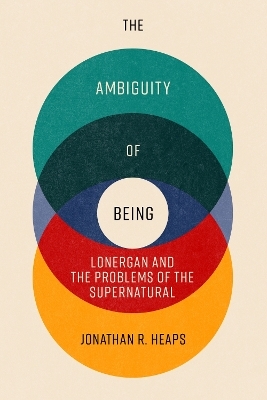
The Ambiguity of Being
Lonergan and the Problems of the Supernatural
Seiten
2024
The Catholic University of America Press (Verlag)
978-0-8132-3804-3 (ISBN)
The Catholic University of America Press (Verlag)
978-0-8132-3804-3 (ISBN)
- Titel z.Zt. nicht lieferbar
- Versandkostenfrei
- Auch auf Rechnung
- Artikel merken
Argues that more detailed engagement with Bernard Lonergan's work implies an oversight in both the 20th- and 21st-century debates.
The debate in Catholic theology over the relationship between the natural and the supernatural has only occasionally engaged with Bernard Lonergan's philosophical and theological contributions on the topic. The Ambiguity of Being argues that more detailed engagement with Lonergan's work implies an oversight in both the 20th- and 21st-century debates. Ambiguity argues the controversy has failed to notice how the problem of the natural and the supernatural is, in fact, two problems. Ambiguity takes both problems in their widest sense to be about action—both divine and human. The first problem asks how God can act in human action. A question for Christians at least since St. Augustine faced the Pelagian controversy, Lonergan retrieved what he understood to be St. Thomas Aquinas' mature solution. It is a solution gathering together a whole series of theological and philosophical developments into a subtle metaphysical theory of divine and human cooperation. But the recent debates have resituated this problem (and various interpretations of St. Thomas's solution to it) in a modern world with modern concerns about culture and politics for the sake of answering a second, intrinsically related, but really distinct question: what is God doing in human action? Ambiguity finds that the recent controversy almost always finds participants attempting to deduce an answer to the second, modern problem from the medieval, metaphysical Thomist solution to the first. By contrast, Ambiguity argues at length the modern problem cannot be reduced to, nor an answer deduced from its medieval, metaphysical partner because the modern problem of the supernatural—what is God doing in human action?—is a hermeneutical problem that calls out for a hermeneutical answer. Ambiguity sketches a heuristic for what a fully adequate answer to this question would require, suggesting a radical re-conception of modern theology's scope.
The debate in Catholic theology over the relationship between the natural and the supernatural has only occasionally engaged with Bernard Lonergan's philosophical and theological contributions on the topic. The Ambiguity of Being argues that more detailed engagement with Lonergan's work implies an oversight in both the 20th- and 21st-century debates. Ambiguity argues the controversy has failed to notice how the problem of the natural and the supernatural is, in fact, two problems. Ambiguity takes both problems in their widest sense to be about action—both divine and human. The first problem asks how God can act in human action. A question for Christians at least since St. Augustine faced the Pelagian controversy, Lonergan retrieved what he understood to be St. Thomas Aquinas' mature solution. It is a solution gathering together a whole series of theological and philosophical developments into a subtle metaphysical theory of divine and human cooperation. But the recent debates have resituated this problem (and various interpretations of St. Thomas's solution to it) in a modern world with modern concerns about culture and politics for the sake of answering a second, intrinsically related, but really distinct question: what is God doing in human action? Ambiguity finds that the recent controversy almost always finds participants attempting to deduce an answer to the second, modern problem from the medieval, metaphysical Thomist solution to the first. By contrast, Ambiguity argues at length the modern problem cannot be reduced to, nor an answer deduced from its medieval, metaphysical partner because the modern problem of the supernatural—what is God doing in human action?—is a hermeneutical problem that calls out for a hermeneutical answer. Ambiguity sketches a heuristic for what a fully adequate answer to this question would require, suggesting a radical re-conception of modern theology's scope.
Jonathan R. Heaps is Director of the Bernard J. Lonergan Institute at Seton Hall University.
| Erscheinungsdatum | 09.02.2024 |
|---|---|
| Verlagsort | Washington |
| Sprache | englisch |
| Maße | 152 x 229 mm |
| Themenwelt | Geisteswissenschaften ► Philosophie ► Geschichte der Philosophie |
| Geisteswissenschaften ► Philosophie ► Philosophie der Neuzeit | |
| Geisteswissenschaften ► Sprach- / Literaturwissenschaft ► Sprachwissenschaft | |
| ISBN-10 | 0-8132-3804-8 / 0813238048 |
| ISBN-13 | 978-0-8132-3804-3 / 9780813238043 |
| Zustand | Neuware |
| Informationen gemäß Produktsicherheitsverordnung (GPSR) | |
| Haben Sie eine Frage zum Produkt? |
Mehr entdecken
aus dem Bereich
aus dem Bereich
eine Geschichte der Zuversicht von Homer bis zum Klimawandel
Buch | Hardcover (2024)
C.H.Beck (Verlag)
CHF 39,20
die kolonialen Wurzeln der französischen Theorie
Buch | Hardcover (2024)
Matthes & Seitz Berlin (Verlag)
CHF 41,90


